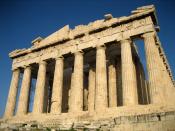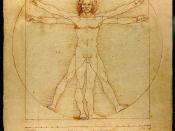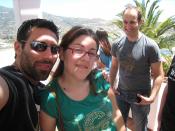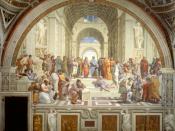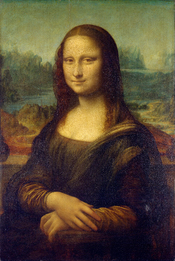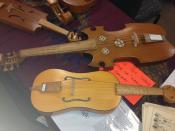The Renaissance was a period in European history when there was a rebirth of interest in the arts and sciences. The name Renaissance means "rebirth." The Renaissance lasted from about 1300 to 1600. The discoveries and ideas of this period completely changed the way people lived, worked, and thought.
The Renaissance began in Italy. Many Italian cities had become important trade centers. Besides goods for trade, people brought science and learning from Asia and the Middle East. Wealthy Italian bankers and merchants became patrons; supporters, of science and the arts. Another great influence that helped bring about the Renaissance was the discovery of the writings of the ancient Greeks and Romans. The example of ancient Greeks and Romans was constantly available to the Italians; their language, which was only codified about 1300, had evolved from the Latin of the Romans, and Italy also had on its soil a wealth of classical ruins and artifacts.
Roman architectural forms were found in almost every town and city. Roman sculpture, particularly in the form of marble sarcophagi covered with reliefs, had been familiar for centuries. These earlier thinkers believed that people should develop all their talents and abilities.
During the Renaissance, writers, artists, and scientists looked at the world around them with fresh interest. Writers began writing books and poems in their native languages, instead of using Latin, as scholars and priests did. Artists painted scenes from nature and created lifelike sculptures of men and women. Great artists of this period included Leonardo de Vinci, Michelangelo, and Raphael.
The Renaissance was a time of scientific discovery. People examined the human body and learned how blood circulates. Two inventions, the microscope and the telescope, showed people new worlds. Copernicus, Galileo, and other scientists changed how people thought about physical forces on earth and in the heavens.
The invention of movable type in the 1440s made it easier to print books. Printing presses were set up throughout Europe. This helped spread the discoveries of the Renaissance.
During this period, towns and cities grew, and many of the manors ruled by lords and small kingdoms united into nations.
People's curiosity about their world helped bring about the Age of Exploration. In the late 1400s, Europeans began to sail across the seas to find and explore new lands.
By the 1600s, the new ideas of the Renaissance were part of everyday life. Many of these ideas still influence the way we look at our world.
